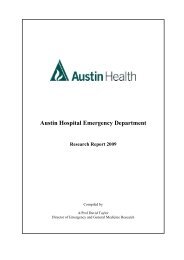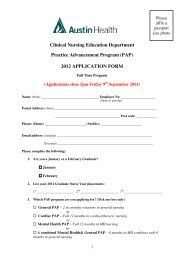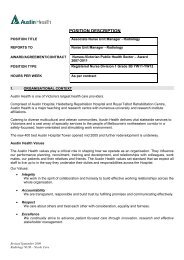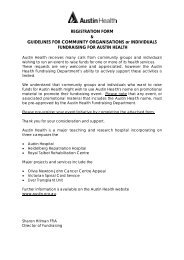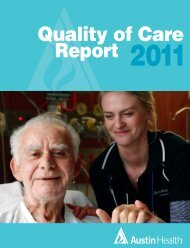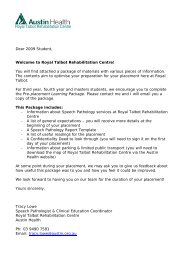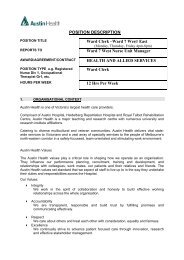About public outpatient services - Austin Health
About public outpatient services - Austin Health
About public outpatient services - Austin Health
You also want an ePaper? Increase the reach of your titles
YUMPU automatically turns print PDFs into web optimized ePapers that Google loves.
<strong>About</strong> <strong>public</strong> <strong>outpatient</strong> <strong>services</strong>Frequently asked questionsWhat are <strong>outpatient</strong> <strong>services</strong>?Victoria’s <strong>public</strong> hospitals provide <strong>services</strong>to patients needing specialist medical,paediatric, obstetric or surgical assessmentand care. They also provide associated alliedhealth <strong>services</strong> (such as physiotherapy)and diagnostic testing. These <strong>services</strong> aregenerally known as <strong>outpatient</strong> <strong>services</strong>, wherea consultation or procedure is provided bya <strong>public</strong> hospital to a person who is notcurrently admitted to the hospital.How is an appointment madefor an <strong>outpatient</strong> service?Patients are referred to <strong>outpatient</strong> <strong>services</strong>from a general practitioner (GP) or anotherspecialist. Sometimes patients are referredto <strong>outpatient</strong>s for follow-up after treatmentin the emergency department or after aninpatient episode.Referrals can be made in a number of ways.For example, your GP may recommenda specialist assessment for a particularcondition. Your GP will write a referral letterto an <strong>outpatient</strong> service provided at a <strong>public</strong>hospital. This referral letter will be to anindividual specialist or a group of specialists.Your GP will post or fax the referral to theappropriate <strong>outpatient</strong> service.Before allocating an appointment, <strong>outpatient</strong><strong>services</strong> prioritise the referrals they receivebased on clinical need. Individual health<strong>services</strong> have protocols and policies to makesure that patients are seen at <strong>outpatient</strong><strong>services</strong> according to their clinical urgency.GPs play a key role in this process and provideinformation to the health service in the referralletter about your clinical condition to allow theprioritisation of your appointment.Once the <strong>outpatient</strong> service has your referralthey will contact you and your doctor, to provideyou with advice about your appointment.How long is my referral valid for?Referrals from GPs are generally validfor 12 months from your first appointment.Referrals from a specialist to anotherspecialist are valid for 3 months from yourfirst appointment.How will I be notified aboutmy appointment?You will receive a letter or a phone call from the<strong>outpatient</strong> service offering you an appointment.You may receive other letters relating to yourappointment as necessary, for example somedoctors may request that you have special testscompleted prior to your initial appointment,such as X-rays or blood tests.
Frequently asked questions about <strong>public</strong> <strong>outpatient</strong> <strong>services</strong>How long should I expectto wait for an appointment?Waiting times for appointments vary acrossspecialties and health <strong>services</strong>.If you are concerned about managing yourcondition until your appointment, you may wishto speak to the doctor who referred you anddiscuss the options available to you.What information will I receivefrom the <strong>outpatient</strong> service?Contact number: You will receive a telephonenumber to call if you have any questionsregarding your appointment.Patient identification number: You mayreceive a designated a patient numberdepending on the health service. This numberis individual to you. When you call the hospitalalways quote your patient number. This assiststhe staff to view your <strong>outpatient</strong> appointmenthistory and answer your questions.A map outlining transport options, parkingand where to find the <strong>outpatient</strong> department.Patients Rights and Responsibilities informationInterpreter Information: You will also receiveinformation on interpreter booking and anumber to call at the health service to bookan interpreter. Please check your letter for atimeframe for making interpreter bookingsas interpreters can be difficult to book atshort notice.What do I do if my contactdetails change?It is important that you ring or write to the<strong>outpatient</strong> service if you change your addressor telephone number. This will ensure the<strong>outpatient</strong> service can continue to contact you.What can I do if my conditionis getting worse?If you have any concerns about changes in yourcondition or health prior to your appointmentyou should contact your GP for advice. Your GPis best placed to manage your health until youare seen at the hospital or to advise the healthservice if your condition is deteriorating.Your GP may also be able to suggest somealternative treatment that may assist youwhile you are waiting to see a specialist atan <strong>outpatient</strong> department.What should I do if I require furtherinformation about anything relatedto <strong>outpatient</strong>s?You can contact the <strong>outpatient</strong> clinic staffthrough the hospital switch board or directlyon the number listed on the letter you receivefrom the health service.How do I change my appointment?If you need to change your appointmentplease contact the <strong>outpatient</strong> service as soonas possible. The contact details will be in theletter you received from the hospital. Staff willbe able to move your appointment to a date ortime more suitable for you, where appointmenttimes are available.
Frequently asked questions about <strong>public</strong> <strong>outpatient</strong> <strong>services</strong>Not attending your appointment may causea delay in your treatment. Not notifying<strong>outpatient</strong>s that you are unable to attendmay prevent another patient being offeredthe appointment time. Please notify the<strong>outpatient</strong> department as soon as you areaware that you are unable to attend.If you miss multiple appointments withoutnotifying the <strong>outpatient</strong> department it mayresult in the necessity to obtain a new referralfrom your GP.What can I do if I no longer needor want an <strong>outpatient</strong> appointment?If you no longer need your appointment pleasenotify the hospital concerned.You can help to reduce waiting times for otherpatients by making sure you let the clinic knowif you can’t attend the appointment.What can I do if I have special needs?Hospitals are able to assist patients withspecial needs when attending <strong>outpatient</strong>appointments. If you are hearing or visuallyimpaired or need an interpreter, it is importantthat you notify the <strong>outpatient</strong> service prior toyour appointment so that assistance can bearranged for you.Am I entitled to transport assistance?For rural Victorian patientsThe Victorian Patient Transport AssistanceScheme (VPTAS) aims to assist rural Victorianswho are required to travel long distances fromhome to seek specialist medical or dentaltreatment from approved specialists. To beeligible for assistance patients must reside ina rural region and travel 100 kilometres or moreone way, or an average of 500 kilometres perweek for 5 weeks or more to receive treatmentfrom a recognised specialist.The VPTAS provides financial assistance forboth travel and accommodation. However,it is not intended to be a full reimbursementscheme, rather it is designed to subsidisethe cost incurred by rural Victorians requiredto travel to receive specialist treatment.To ensure assistance is provided where it ismost needed, those patients who are eligibleto claim assistance under other registeredbenefit organisations, including Departmentof Veteran’s Affairs, are ineligible to claimunder VPTAS as they are able to do sothrough the Department of Veteran’s Affairs.Additionally VPTAS assistance does not applyfor patient travel by ambulance, air ambulanceor emergency support vehicles; the costsincurred by family members visiting patientsat a treatment destination; nor other costsincurred at the treatment destination suchas car parking and e-tag tickets.
Frequently asked questions about <strong>public</strong> <strong>outpatient</strong> <strong>services</strong>For local patientsIf you require transport assistance pleasediscuss with your GP the type of transportyou require to take you to and from yourappointment. There are many types of transportavailable, such as Red Cross, and communityvolunteers. Specialised transport assistanceis provided for people who have a clinicalneed and is booked by the health service.Further information on non emergency clinictransport to <strong>outpatient</strong>s is available from theMetropolitan Ambulance Service web site.www.mas.vic.gov.au/Main-home/What-We-Do/Non-Emergency-Services/Clinic-Transport-Services.htmlWhat are the hours for <strong>outpatient</strong><strong>services</strong>?Most <strong>outpatient</strong> <strong>services</strong> are open Mondayto Friday 8.30am to 4.30pm and are closedon <strong>public</strong> holidays.Individual clinics run on a specific day andtime of the week.What do I need to do beforemy appointment?Before your appointment, please ensurethat you:• obtain any test results needed for yourappointment• make a list of any medications or dietarysupplements that you take• write down any questions that you mayhave for the doctor (it is often helpful todo this beforehand).What do I need to do on theappointment day?On the day of your appointment please bring:• the appointment letter you received from the<strong>outpatient</strong> clinic• any relevant X-rays, scans (CT or ultrasound),blood tests or other test results• the list of current medications you are taking• your Medicare card, pension card (if you haveone) and any other concession card you mayhold (your Medicare card must be presentedeach time you attend a <strong>outpatient</strong> clinic)• your GP’s address and phone number• any medication or dietary supplements youmay require during your visit (many hospitalshave cafes or snack machines on site, but youmay like to bring your own food)• a small toy or book for any children who areattending the clinic with you.Is car parking available?Patient set down/pick-up zones are usuallysituated close-by. <strong>Health</strong> <strong>services</strong> will be ableto give you information regarding parking andparking charges.What do I need to do on arrivalat the <strong>outpatient</strong> department?When you arrive, please go to the receptiondesk to check-in. Staff will check your detailsand may ask to see your Medicare or pensioncard. They will then direct you to the waitingarea for your clinic.
Frequently asked questions about <strong>public</strong> <strong>outpatient</strong> <strong>services</strong>How long will my appointment take?It is important that you carefully read anyletters you receive from the <strong>outpatient</strong> serviceabout your appointment, and what items youneed to bring to your appointment.It is recommended that you allow up to twohours for your appointment. All patients aregiven a specific appointment time and theclinic is organised according to the number ofstaff at each clinic and the anticipated lengthof time that each patient may require. Theremay be more than one patient with a particularappointment time because there will be morethan one staff member running the clinic atthat time.Although appointments are for a set time,delays can unexpectedly occur. The staff maybe delayed by unexpectedly needing to discussa complicated treatment or diagnosis with apatient, or occasionally staff may be urgentlyrequired elsewhere in the hospital. Should anysuch delays occur, you will be kept informedby the clinic staff. Another appointment canbe arranged for you in the event that you areunable to wait for your appointment.Plan to arrive 10 minutes before your allocatedappointment to allow time to complete anypaperwork that you may be asked to fill in,especially at your first visit.Will I be seen by students?Patients may be seen by a range of healthcare professionals including students fromallied health, nursing and medicine who arein different stages of training. Public hospitalsare teaching hospitals and it is intended thatstudents interact with patients to increase theirclinical knowledge. However it is the patient’sright to refuse to be seen by a student.Your doctor should introduce these staff to you.If you would prefer not to have additional staffpresent please let the doctor know. This will notaffect your care in any way.Can I ask questions duringmy appointment?During your assessment you may ask thedoctor, nurse or allied health staff questionsat any time. If you don’t understand anythingthat is explained to you, please ask for it to beexplained again.How do I get a medical certificate?You should ask the doctor during theappointment for a medical certificate if yourequire one.
Frequently asked questions about <strong>public</strong> <strong>outpatient</strong> <strong>services</strong>What should I do if I have concernsabout my <strong>outpatient</strong> appointment?You can give your opinion about the care or theservice you receive in any part of the hospital.This may be in the form of a compliment ora complaint.Each Victorian <strong>public</strong> hospital has a patientrepresentative. This person is your contact ifyou have any concerns or compliments aboutthe treatment you have received at the hospital.The patient representative will work with youto find a resolution to any complaint or, ifnecessary, investigate the matter further.For details on your rights and responsibilitiesas a patient, please visit the Victorian PublicHospital Patient Charter website at:www.health.vic.gov.au/patientcharter/patientInformation about <strong>outpatient</strong> <strong>services</strong> isalso available from individual health <strong>services</strong>on their websites. A list of health servicewebsites is available on:www.health.vic.gov.au/hospitals/indexA range of initiatives have been undertakenjointly by the Department of HumanServices and Victorian <strong>public</strong> health<strong>services</strong> as part of the OutpatientsImprovement and Innovation Strategy. Stafffrom <strong>public</strong> health <strong>services</strong> and consumerfocus groups have provided informationabout the consumer’s experiences inVictorian <strong>public</strong> hospital <strong>outpatient</strong> settings.Responses to Frequently Asked Questions(FAQ) have been developed to support thepatients’ experience and communicationbetween <strong>outpatient</strong>s, consumers and GP’s.The responses have been developed bythe Department of Human Services inconsultation with representatives from arange of stakeholders including health <strong>services</strong>management, clinicians and consumers.January 2008



